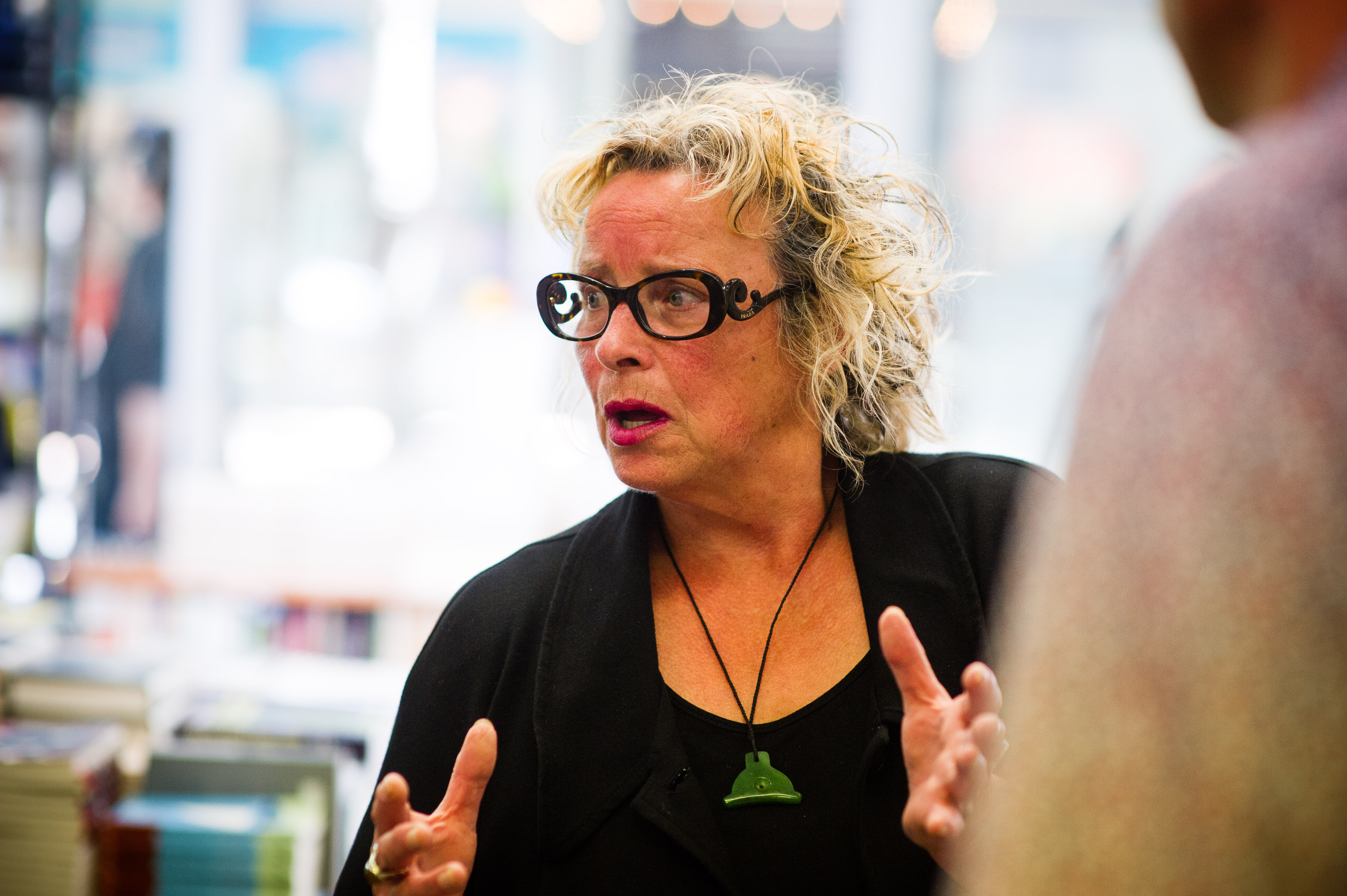
And we are well into the second pot, and having serious discussions about the possibility of gin, by the time that particular quote appears. Lloyd is telling me about a few of the perils of retailing in general, and running a successful independent bookshop in particular. You second guess one author’s popularity incorrectly, and you’re stuck with a bin full of stock at half price, trying to move it on to make room for the next bestseller or surprise smash hit. But get it wrong the other way, and there’s a queue of punters out the door, asking for a book you only thought to bring in a few copies of.
In books, as with movies and music, you’re never sure where the next big thing might come from, or what innocuous little paperback from a first-time author might suddenly explode in the public consciousness. So, she says, you just have to back yourself and your staff to the hilt. Hence, “If you want it, you must have it.” It was first said to her by Unity Books founder Alan Preston, just across the road from the shop’s current Willis Street incarnation. Lloyd was unsure of a purchase. She loved the book in question herself, but didn’t know whether there would be a market for it. “But”, she says, “you just have to back yourself don’t you? It’s bloody scary at times, but what else can you do? Alan gave us that.”
“You know, I guess the Internet has been a challenge for every bugger. But when the dust settles, it’s given us – even us booksellers – more than it’s taken. Yes, people can order a book online now. We’re right into it ourselves – our own Unity Books site goes gangbusters too – but, more than that, people are reading more now. And because of all the wonderful blogs and sites, they’re hearing about books that they might not have heard of before. And they’re sharp too. They’ll be in the shop on Monday, asking us about something they read about in the New York Times online the night before. I love it. Keeps us on our game.”
The steps to Tilly Lloyd’s house are narrow, steep, made of ancient cement, and flanked by a broken and rusting handrail that looks like a dose of tetanus just waiting to happen. It is the sort of ascent that would put off all but the hardiest Jehovah’s Witness, and scare any door-to-door sales type or pamphlet-dropping estate agent into trying their luck at some safer altitude down the road. Which is almost certainly one of the reasons Lloyd leaves these steps in such an unabashed state of disrepair. Most days I would enjoy the climb. I like people who value functionality over appearance, and the steps are nothing if not functional. But an hour before I’m due to interview Lloyd, the seabed beyond Castlepoint has had a small tantrum, the whole region is in a state of high nervousness, and these steps are leaning off to the north at an angle that would give an EQC inspector conniptions.
I figure they’ve been like this for decades, but I’m not chancing it today, and I jog up them sharpish. At the top, there is one of those views that we Kapiti coast types take annoyingly for granted. On a bright day from here, Lloyd would be gazing out at the top of the South Island, Kapiti Island, and even clear up to the Taranaki Bight if the weather was really playing ball. But today, we’re enjoying a rare misty and rainswept January day. Kapiti is a half-glimpsed shadow, literally looming through a sodden bank of clouds, and the islands and inlets that form the northern reaches of the Marlborough Sounds come and go through the squalls.
It is a beautiful day, in its own unseasonable and unexpected way, and Lloyd’s garden is a fine spot from which to appreciate it. And so, in a still howling southerly and the constant expectation of a major shake and an unsurvivable tsunami, and accompanied every step of the way by a small but energetic terrier with delusions of guard-doggery, I found myself knocking at Lloyd’s front door.
“We’ve a policy, at Unity Books,” she tells me. “I call it the foible clause: everyone is allowed one foible, and everyone else accommodates that foible, as they accommodate ours. It’s singular, of course. You might be a mumbler, always one minute late back from lunch, not so flash at communicating something intricate with the customers, or you might spend longer in the bathroom than anyone else, but that’s all OK. Because everyone’s different, and getting to know and trust someone is the process of learning their foibles, and learning to work with them. And as long as I’m accepting of yours, then you will be accepting of mine. It’s not about bad behaviour, because the staff are absolutely bloody wonderful. If anything, it’s about honesty, and people who are prepared to let themselves show. As long as you’re honest, we’ll work with it. We might even find a way to celebrate it. Anyway, if you ever meet anyone who seems perfect, they’re the one who will let you down, eh?”

Tilly looks at me curiously for a moment, and apparently decides that either I’m not yet ready to hear the answer to that, or that if I can’t work it out for myself, I should just shut up until I can. A foible is surely what other people see in you, and not what you see in yourself. But I make a mental note that Lloyd’s foible is a complete inability to complete one story before ricocheting off into another.
“Are you going to focus on the bit of shit on the windscreen,” she says, “or are you going to look through it to the road ahead?”
It is becoming an afternoon of pithy mantras, and this one might be my favourite yet.
“I used to work for a marvellous man, back when I was just starting out, when I was repping for a publishing company. I was having a dispute with a client – I can’t even tell you whether it was an outlet or a publisher, because it doesn’t matter. Anyway, I was young, and I let this idiot get under my skin, the way we do when we’re young and everything seems so bloody important. And my sales manager took me aside said that to me – ‘Are you going to focus on the bit of shit on the windscreen, or are you going to look through it to the road ahead?’ – I love that. And it’s got me through a lot of days since. Because you have to remember, you have to believe, that what you are doing is worth it. And as long as you are doing something that’s worth it, then are you really going to let one dispute or problem distract you from what you’re actually supposed to be doing?”
I loved the emphasis on ‘supposed’ – and it comes through loud and clear on my recording. Because there is no doubt at all that Tilly Lloyd is supposed to be selling books.
Two things about Tilly Lloyd: she pours a strong gin, and she looks a bit like Meryl Streep. These facts might not be unconnected.
Or at least, she looks like Streep’s stouter colonial cousin: all in black, a slash of lipstick, cheekbones just this side of haughty, and an outstanding – upstanding – vaguely leonine blonde mane.
It’s there in the house of course, which looks like the second-hand bookshop of your dreams. It’s a simple place, built around the bones of a 100-year-old bungalow, but expanded sideways and upwards until you’d think it was some tasteful, understated, modernist pile from the mid-1970s. The ceilings are high, and the walls – what you can see of them – are a plain white. But what you can see of them isn’t that much. There are bookshelves built into every room, each one full to bursting. Lloyd has divided them up roughly into sections, which would be the only way of having even a fighting chance of finding the one book you might be after. She swings her glass in a wide arc, ice clanking, gesturing at various points on the shelves: “That’s history, Pacific, modern New Zealand stuff I like, all of that up there is sex basically, and I’ve put politics right next to it.”
“God, the last few years have been tough on Wellington,” she says. “I really see it with some of our regulars. Gorgeous people, public servants, business people, beautifully read, hungry for anything, great taste. I’d see some of them three times in a week, and they’d always leave with a pile of great stuff. Now, some of those same people are coming in once every couple of months, and maybe only buying one or two. We lose a few to the Internet of course, but they come back. They look all bloody sheepish and tell me they’ve been playing away. Hah!
“But it’s sad to see the ones you know would still be regulars, but they’ve been down-sized or shoved out, and they’re having to cut back. It’s never the young ones either. Nothing against them, so many of them are wonderful too, but it feels like we’re gutting a generation that actually know how to get things done. Free-thinkers a lot of them, wonderfully knowledgeable about all sorts of things. But that doesn’t fit in with today’s bloody paradigm does it? What a loss.”
“Let’s not talk about childhood and all that shit,” she says. “It’s just another rural alcoholic story anyway. God knows there’s enough of them, and they don’t sell.”
Amen to that.






